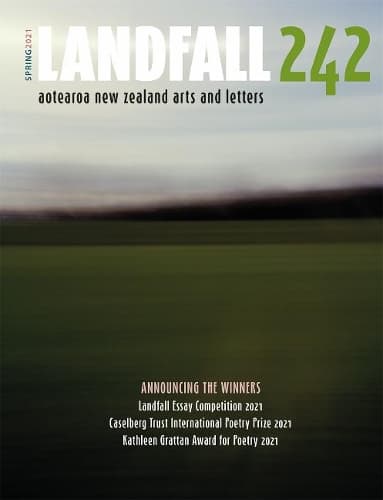Review: Landfall 242
Reviewed by Paula Green
Landfall 242 is the perfect arrival for summer reading with its inclusion of poetry, prose, essays, reviews and artwork. Michelle Elvy edits the review section, both in print and online, and Landfall’s reviews continue to be an essential part of our literary landscape: astute, personal, longer pieces that open rather shut down reading. Harry Rickett’s review of The Mermaid’s Purse by Fleur Adcock is sublime.
The inclusion of artwork is always highlight. Conor Clarke’s stunning photographs were produced in collaboration with members of the blind community and include narrations you can listen to via a QR code. The blurred images smudge sight enigmatically.
The results of three competitions are announced. Emma Neale judges the essay competition (there were 76 entries) and selected Andrew Dean’s knotty essay on tracing his Jewish grandparents in London’s East End, researching Jewish jokes, and braiding the personal and the political.
Majella Cullinane judges the Caselberg International Poetry Prize 2021. Winner Sophia Wilson and runner-up Jenna Heller’s poems are included. David Eggleton judges The Kathleen Grattan Award for Poetry 2021. This competition is for a full-length manuscript with potential publication by Otago University Press. Reading Eggleton’s comments, I am dead keen to read the submissions of Rebecca Hawkes, Robyn Maree Pickens and Nick Ascroft. When Eggleton says the winner Michael Steven’s poems “have been quarried out of silence and watchfulness,” I am hooked. He quotes:
My thoughts returned to my own son.
When I looked back, the farmhouse was empty.
There was no mother hanging out washing,
no child at play. The gold plains burned.
I carried the father’s silence away inside me.
Literary journals are an excellent way to keep your finger on the pulse of writing in Aotearoa. I am drawn both to familiar voices and to new discoveries; to writing that roves widely in view of style, voice and subject matter. As the new editor, Lynley Edmeades has succeeded in multiple tones but I feel discomfort at the predominantly white anthology. There is such a groundswell of Māori, Pasifika and Asian writers I expect greater representation in our national journals.
Edmeades’ selection includes poems and short fiction that lift to memorable terrain. Elizabeth Smither’s poem Porthills, Canterbury is the best landscape poem I have read in months. David Eggleton’s Sawmill Empire is equally sublime. I am moved by Ruth Arnison’s Winter Calls and captivated by E Wen Wong’s My parents on why we are not in the phonebook. This young poet writes with poise, edge and insight:
In class I write my name on a yellow page.Year 13 History is turmeric soup
diluted with milk of colour and the colour is white.
We read an exemplar on the Chinese poll tax
like it’s an extract from Winne-the Pooh
noting its well-crafted phrases
with our plastic yellow highlighters.
The discoveries are numerous. Melody Nixon’s Outbreak narratives shows how writing fuelled in the time of Covid can be innovative, moving, multi-layered. Eileen Kennedy’s short story The Wedding in September is exquisitely crafted, character rich, surprising. Olly Clifton’s terrific short story opens with the delivery of a large soldier from a museum and ends with a paparazzi twist. Hayden Pike’s small poem Ostrich is magnificent in its physicality and the unsaid. Bronte Heron’s poem is equally economical, equally layered. I want to read more from these writers, which to me signals the success of the journal.
Aside from my one key misgiving, the latest issue of Landfall is a feast of superlative writing. I will leave you with a taste of Elizabeth Smither’s poem:
Never such a violent declension
or shortage of words for it.
Not ‘magnificent’, far more slippery
as they tread with giant steps through gorse
or peer over a road they’ve made perilous
from Porthills, Canterbury
Reviewed by Paula Green
